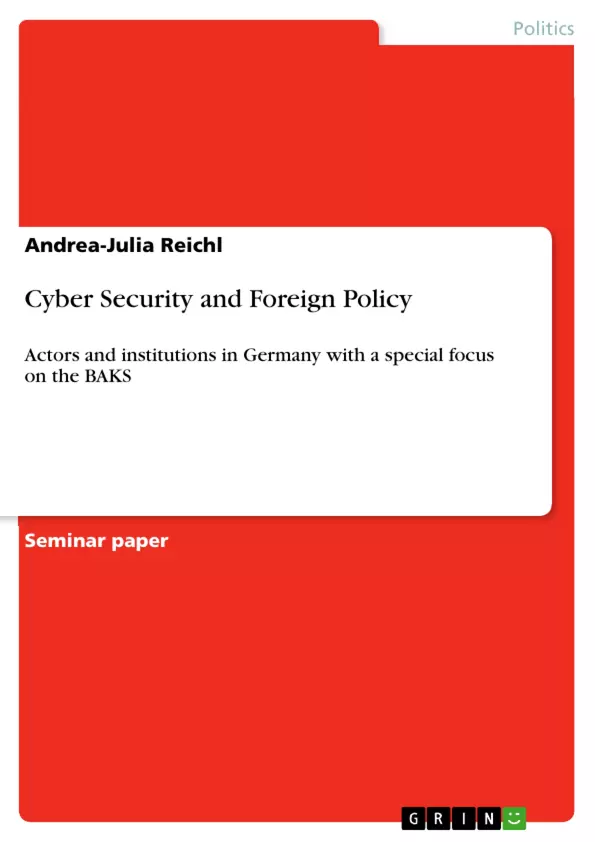Within this approach to Cyber Security, the focus and analysis will be placed on the BAKS (Federal Academy for Security Policy) and their role inside Cyber Security, the interdependencies and moreover how a current topic triggers changes in institutional and organizational aspects of Think Tanks.
Inhaltsverzeichnis (Table of Contents)
- Introduction
- Theoretical introduction of the subject: CYBER SECURITY
- Cyber Security: Historical development within policy
- Cyber Security: Institutions and Actors of „domestic security“ in Germany
- Cyber Security: Topic for an European and International Level
- Cyber Security: Foreign Policy Issues - Think Tanks
- Theoretical background of the topic: THINK TANKS
- Definition: Think Tank
- Think Tanks and Cyber Security
- Federal Academy for Security Policy (BAKS)
- FEDERAL ACADEMY FOR SECURITY POLICY (BAKS)
- Organisation and Self - Image
- Institutional Framework and Public Discourse
- BAKS - Think Tank?
- BAKS within Cyber Security
Zielsetzung und Themenschwerpunkte (Objectives and Key Themes)
This seminar paper examines the growing influence of IT-related issues and incidents on contemporary politics, focusing on the role of think tanks in shaping foreign policy on cyber security. It analyzes the Federal Academy for Security Policy (BAKS) and its role in cybersecurity, particularly in the context of think tanks and their interdependencies.
- The historical development and contemporary challenges of cyber security.
- The institutional framework and actors involved in cyber security in Germany, particularly focusing on the BAKS.
- The role of think tanks in shaping foreign policy on cyber security.
- The relationship between the BAKS and think tanks, analyzing its position within the broader landscape of cyber security policy analysis.
- The need for a cross-sectoral approach to address cyber security challenges.
Zusammenfassung der Kapitel (Chapter Summaries)
The introduction provides context for the paper's topic, highlighting the growing importance of cyber security in contemporary politics. It discusses the increasing frequency of cyber-attacks and their potential for causing damage, emphasizing the need for a comprehensive understanding of this issue.
Chapter 2 delves into the theoretical framework of cyber security, exploring its historical development and outlining the main schools of thought. It examines the role of cyber security in domestic security and its implications for foreign policy.
Chapter 3 focuses on the theoretical background of think tanks, defining the term and exploring their role in shaping policy. This chapter analyzes the intersection of cyber security and think tanks, examining how these institutions contribute to the development of policy in this area.
Chapter 4 examines the Federal Academy for Security Policy (BAKS) in detail, exploring its organization, self-image, and institutional framework. This chapter analyzes the BAKS's role as a think tank, focusing on its activities within the field of cyber security.
Schlüsselwörter (Keywords)
Cyber security, think tanks, foreign policy, Federal Academy for Security Policy (BAKS), domestic security, institutional framework, policy analysis, cross-sectoral approach, IT-related issues, cyber-attacks, think tank role, interdependencies.
Frequently Asked Questions
What is the role of the BAKS in Cyber Security?
The Federal Academy for Security Policy (BAKS) acts as a think tank and institutional framework for analyzing security policy and public discourse in Germany.
How do think tanks influence foreign policy regarding IT issues?
Think tanks shape foreign policy by providing expert analysis, triggering institutional changes, and fostering international cooperation on cyber threats.
Why is a cross-sectoral approach to Cyber Security necessary?
Due to the high interdependency of IT systems, security challenges affect domestic, international, and economic policy simultaneously.
What are the main actors of "domestic security" in Germany?
Key actors include government institutions, security agencies, and specialized organizations like the BAKS that focus on policy analysis.
How has Cyber Security developed within policy over time?
It has evolved from a technical niche into a central pillar of national and international security strategies due to the rise of cyber-attacks.
- Citar trabajo
- Andrea-Julia Reichl (Autor), 2016, Cyber Security and Foreign Policy, Múnich, GRIN Verlag, https://www.grin.com/document/336862



